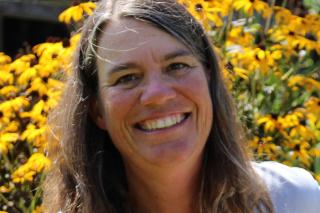Laura is executive director and clinician at Wild Irish Farm, an equine-facilitated psychotherapy (EFP) center that she founded in Newington, New Hampshire. Her innovative program helps children with mental health needs through a combination of individual or family psychotherapy and riding or interacting with the stable’s eight horses.
Recently, she began a pilot study at the farm to analyze the effectiveness of equine-assisted play therapy for seven- to eleven-year-olds with anxiety.
“Horses are motivating for children, yet they’re also a source of fear,” says Laura. “So we’re teaching kids how to understand them and to become more comfortable through different feedback mechanisms.”
What brought her to Simmons' PhD in social work program
An experienced equestrian and social worker with 20 years of experience, Laura had identified a significant gap in research on equine-facilitated psychotherapy. She came to Simmons University's School of Social Work, she says, to learn how to conduct robust studies on her team’s approach and outcomes, with an eye toward elevating scholarship in the field.
“I realized I have a unique voice,” she says. With plans to work full time while pursuing her PhD, Laura appreciated the flexibility of the part-time program at Simmons and its focus on developing scholar-practitioners. “It was all that I wanted a school to be,” she says.
It was all that I wanted a school to be.
How Simmons is preparing her
Now in her second year, Laura has completed foundational coursework in qualitative and quantitative research, statistics, and epistemology. To design and launch the pilot study, she consulted with her advisor, Jennifer Putney, PhD. Laura anticipates that this research will form the framework for her dissertation.
She describes the learning environment at Simmons as “engaging and thought-provoking,” with encouraging professors and a cohort of classmates from diverse yet complementary areas of social work. Laura believes this balance of rigor and support will prepare her for her goals, including creating a scalable therapeutic model, teaching part-time, and developing an EFP certificate program to standardize knowledge and credentials.
“The PhD program brings together all my experiences and interests in one place,” she says.
Why completing a PhD in social work is rewarding
“I love the research,” says Laura. “I love beginning to apply it at the farm and to think more critically about how we do things and why we do them. There are so many different directions that we can take this work. More research will hopefully mean greater access to high-quality EFP programs for children and their families. Being a part of that is so exciting.”

